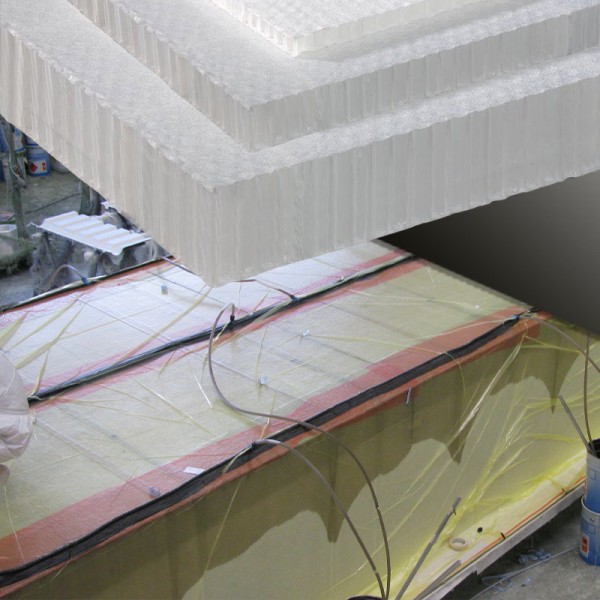

Lightening composite parts with infusion
Nidaplast sheets made up of extruded polypropylene honeycombs are coated on both sides with a plastic film and a non-woven fabric, facilitating laminating, gluing or infusion techniques. Why [...]






Nidaplast panels are honeycomb structures, made up of 8mm honeycombs, made of extruded polypropylene.
The nidaplast 8RI is an ideal product for the infusion technique. Its specially reinforced PP (polypropylene) film resists the pressure of the resin during installation and thus prevents the resin from filling the cells.
The surface coating (non-woven polyester) makes it possible to laminate or glue practically any type of material, for applications in many fields: building, transport, water sports, industrial equipment, sport, leisure, etc.
The Nidaplast 8RI product has the "Certificate of Naval Approval" issued by DNV. Germanischer Lloyd certificate.
Large panel dimensions: 2500 x 1220 mm
Different thicknesses: from 5 to 40 mm (other thicknesses on request)
Cell size: 8 mm
Indicative surface mass for a 20 mm panel: 1.9 kg / m2
The polyester nonwoven present on the nidaplast honeycomb cores provides an ideal surface for impregnation with thermosetting resins (polyester, epoxy, etc.).
The thermo-welding of this nonwoven on the honeycomb structure ensures it a perfect grip.
For nidaplast RI, the plastic film placed under the nonwoven is thicker (300 μm) than nidaplast 8 (50 μm).
The honeycomb is made of polypropylene, a durable and 100% recyclable material.
The honeycomb structure composed of 95% vacuum uses little material while ensuring high mechanical properties.
We sell exclusively to professionals from an order threshold.
If you are a professional, contact us to study your requests.
The nidaplast panels are manufactured on our industrial site in France.

Nidaplast sheets made up of extruded polypropylene honeycombs are coated on both sides with a plastic film and a non-woven fabric, facilitating laminating, gluing or infusion techniques. Why [...]